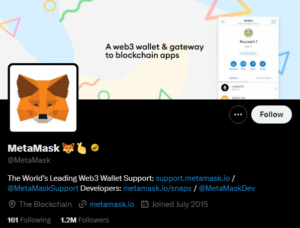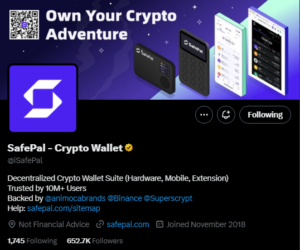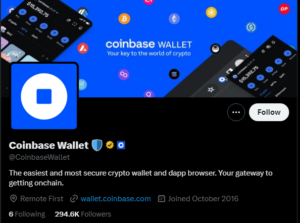What is NFT wallets
A digital wallet made especially for keeping non-fungible tokens (NFTs) is known as an NFT wallet. NFTs are unique digital assets, such as digital music, films, art, in-game products, or other artistic works that represent ownership or authentication of a specific item. In simple terms, NFT wallets are digital safes created specifically for the safekeeping and maintenance of non-fungible tokens (NFTs). NFT wallets handle the particular characteristics of NFTs, in contrast to regular cryptocurrency wallets used for fungible tokens.
On a blockchain, NFT wallets hold the private keys needed to access and control NFTs. Although they maintain the keys that confirm to ownership of such digital assets, Wallets do not really own the NFTs themselves. The main NFT blockchain, Ethereum, is supported by the majority of NFT wallets; however, many also support alternative blockchains, such as Binance, Solana, Polygon, and Tezos.
Users may safely purchase, sell, transfer, and manage their NFTs with these wallets. They offer ways for connecting with different NFT platforms and markets.
To secure users’ assets from unwanted access, NFT wallets include a number of security features such encryption, multi-factor authentication, and biometric authentication.
NFT wallets come in two primary varieties:
- Hot Wallets: These are software wallets accessible through apps or browser extensions. They’re convenient but can be more vulnerable to cyber attacks.
- Cold Wallets: Hardware wallets resemble USB sticks and provide offline storage for maximum security.
The NFT wallet which best fits you will depend on your priorities. If security is your top priority. Anybody working in the NFT industry needs an NFT wallet because they offer the features and safety required to handle digital assets efficiently.
Now we disscuss about what are the most secure and best nft wallets in 2024

01. MetaMask ; MetaMask is a popular cryptocurrency wallet and gateway to blockchain apps, If you’re interested in Ethereum-based NFTs or are new to the NFT ecosystem, MetaMask is a well-liked NFT wallet choice. It enables safe administration of digital assets by acting as a mobile app and browser extension.
uses Ethereum primarily, but it may also be integrated with other EVM-compatible networks, such as Polygon, Binance Smart Chain, and others. Users maintain complete custody of their assets by controlling their seed phrases and private keys. It can be connected with hardware wallets such as Ledger and Trezor for enhanced security. Now we discuss about the pros and cons about the metamask wallet.
| Pros | Cons |
| 1.User-Friendly;
Beginners may easily utilize the user interface because it is simple to use and familiar. |
Transaction Fees: Gas costs, which can be expensive during network congestion, are paid by users for transactions. |
| 2. Large User Base; With more than 21 million users, MetaMask has a strong and vibrant community that guarantees continued development and maintenance. | Limited Customer Support; MetaMask does not offer standard customer service channels. Self-service solutions and internet resources are used for information and troubleshooting. |
| 3. Marketplace Integration; MetaMask allows you to purchase and sell NFTs right within the wallet by establishing seamless connections with a number of NFT markets | No Native NFT Display: In contrast to some other wallets, MetaMask lacks an inbuilt gallery for displaying NFTs in the wallet interface. |
| 4. High Security; users’ private keys are kept under control in a non-custodial wallet. For more protection, hardware wallets are also supported. | Recovery Phrase Responsibility: With MetaMask, the responsibility of protecting your recovery phrase is entirely on the user. You risk losing your NFTs permanently if you miss this phrase. |
| 5. Wide dApp Compatibility; strong integration with many other dApps, especially those related to NFT. | Security Risks: As MetaMask is a hot wallet—a wallet that is linked to the internet; it is by nature more susceptible to cyberattacks than cold wallets. This might be a worry for those who own really valuable NFTs. |

02. Alpha wallet ; The open-source, mobile-only cryptocurrency wallet AlphaWallet was created with the express purpose of handling Ethereum-based assets, such as NFTs. It is well praised for its powerful features and easy-to-use interface, which appeal to both beginner and experienced computer users. With its emphasis on security and adaptability, AlphaWallet is an effective rival in the NFT wallet market.
| Pros | Cons |
| 1. Open-Source: AlphaWallet’s code is accessible to the public because to its open-source nature, which promotes flexibility and ongoing community progress. | Mobile-Only: Limited to mobile devices, which may not be convenient for users who prefer desktop wallets |
| 2. Tokenization: Within the wallet, users have the ability to generate and monitor their own NFTs and other tokens. | Ethereum-Only: Its value for customers wishing to manage assets on other blockchains may be limited by the fact that it only supports Ethereum and tokens based on Ethereum |
| 3. Secure Enclave: makes use of the secure enclosure on the device to improve security while storing private keys. | Limited Customer Support: Compared to some custodial wallets, customers may see less direct customer service because the platform is mostly community-driven. |
| 4. Ethereum Support: ERC-20, ERC-721, and ERC-875 tokens are Ethereum-based, and it supports them all, which makes it perfect for handling different NFTs and digital assets. | |
| 5. Gaming and NFTs: Certain blockchain games and NFT platforms, such as OpenSea, CryptoKitties, and others, are specifically integrated with AlphaWallet |

03. Trust wallet ; Trust Wallet is a popular mobile-only cryptocurrency wallet owned by Binance. In addition to supporting a large number of cryptocurrencies, it is well-known for integrating with decentralized apps (dApps) and supporting NFTs. With its easy-to-use the interface and strong security features, Trust Wallet is a top option for cryptocurrency fans.
| Pros | Cons |
|---|---|
| 1.Wide Range of Supported Assets: allows for a wide range of tokens and cryptocurrencies to be supported, giving users with different portfolios options. | No Two-Factor Authentication (2FA): This additional security feature, which provides an additional level of protection for transactions and logins, is missing from Trust Wallet. |
| 2.Staking Options: provides multiple coin staking, enabling users to earn rewards in a passive manner. | Not as Secure as Hardware Wallets: It is not as secure as hardware wallets, despite having advanced security measures. |
| 3. NFT and dApp Support: expands the wallet’s capabilities by allowing users to handle their NFTs and engage with dApps straight from the wallet. | Dependency on Binance: Because it is controlled by Binance, consumers looking for a more decentralized solution might not find it to be as appealing because of its heavy emphasis on Binance Smart Chain. |
| 4. User-Friendly Interface: Because of its user-friendly interface, the software is appropriate for both beginner and experienced users. |

04. Safe pal wallet ; A number of different cryptocurrencies and NFTs are supported by the safe, decentralized SafePal Wallet. its also the one of the best nft wallets in 2024. This all-in-one solution for managing digital assets comes in the form of a mobile app, browser extension, and hardware wallet. SafePal is renowned for its strong safeguards and simple user interface.
| Pros | Cons |
|---|---|
| 1. Multi-Currency Support: supports more than 10,000 cryptocurrencies, such as different ERC-20, ERC-721, and BEP-20 tokens as well as Bitcoin, Ethereum, and Binance Coin. | Mobile Dependency: Security for the browser extension and mobile app depends on the integrity of the device, which may not be as safe as it is for the hardware wallet. |
| 2. High Security: Strong security is offered by the hardware wallet, which stores private keys offline and verifies transactions physically | Learning Curve: Although the interface is easy to use, it may take some time for newcomers understand all of the features and security precautions. |
| 3. Cost-Effective: In comparison to other hardware wallets available on the market, the hardware wallet is reasonably priced | Limited Customer Support: all ready mentioned |
| 4. Wide Asset Support: supports a wide range of NFTs and cryptocurrencies, giving customers with different portfolios flexibility. |

05. Coin base wallet ; One of the biggest and most respected cryptocurrency exchanges, Coinbase, created the Coinbase Wallet, a self-custody cryptocurrency wallet. Coinbase Wallet is a stand-alone program that gives customers complete control over their digital assets and private keys, in contrast to the Coinbase exchange wallet. It provides a safe and easy-to-use interface for managing digital assets and interacting with decentralized apps (dApps), supporting a large variety of cryptocurrencies and NFTs.
| Pros | Cons |
|---|---|
| 1. User-Friendly: Because of its simple, clear design, the interface is usable by users with a variety of experience. | Higher Fees: If you plan to use Coinbase Wallet for frequent trades or transfers, you may want to take into account the potentially high transaction costs (also known as gas fees) associated with the Ethereum network. |
| 2. Wide Asset Support: supports a wide variety of NFTs and cryptocurrencies, enabling users to manage a variety of portfolios. | Mobile-Only: mostly accessible through a mobile app, which might not be to everyone’s liking when it comes to desktop wallets. |
| 3. NFT Support: It is possible to buy, trade, and transfer NFTs using the Coinbase Wallet in addition to holding and managing them. | Limited Blockchain Support: Coinbase Wallet is mainly concerned with the blockchains of Ethereum and Polygon. It might not work well if you interact with NFTs on
other blockchains. |
| 4. Secure: The security features offered by Coinbase Wallet are well-balanced. It gives consumers more control over their assets by allowing them to keep their own private keys (self-custody) and applying multi-factor authentication (2FA). |

06. Enjin Wallet ; The blockchain-based gaming company Enjin is best known for its mobile bitcoin wallet, Enjin Wallet. The wallet’s purpose is to offer a safe and convenient way to handle a variety of cryptocurrencies and non-fungible tokens (NFTs). Its significant focus on blockchain gaming and digital collectibles makes it especially well-liked among gamers and NFT fans.
| Pros | Cons |
|---|---|
| 1. Multi-Currency Support: supports a large number of cryptocurrencies, such as all ERC-20, ERC-721, and ERC-1155 tokens as well as Bitcoin, Ethereum, and Litecoin. | Mobile-Only: Available only as a mobile app (iOS and Android), which may not be suitable for users who prefer desktop wallets. |
| 2. Security: offers cutting-edge security features including customizable transaction limits, biometric identification, and dual encryption. | Limited Blockchain Support: Primarily focused on Ethereum and Ethereum-based tokens, which might not be ideal for users looking to manage assets on other blockchains. |
| 3. Enjin Beam: a special function that lets users rapidly obtain NFTs and other digital assets by scanning QR codes. | Gaming Focus: Although excellent for gaming, anyone seeking a more versatile wallet may find alternative choices to be more appropriate. |
| 4. Custom Token Flexibility: gives customers the option to manage a wide range of digital assets by enabling them to add customized tokens. | |
| 5. Comprehensive NFT Support: strong characteristics for NFT management, particularly in the gaming domain. |

07. Math wallet: Next we talk about one of the best nft wallets in 2024 is math wallet. Math Wallet is a multi-platform cryptocurrency wallet that supports a wide range of blockchain networks and digital assets, including NFTs. It allows customers to manage their assets across many devices with versions for desktop, web, and mobile platforms. One of Math Wallet’s most well-known features is its extensive support for several blockchains and its ability to integrate with decentralized apps (dApps).
| Pros | Cons |
|---|---|
| 1. Multi-Chain Support: supports more than 70 blockchains, including as Polkadot, Solana, Ethereum, and Binance Smart Chain. Its broad support gives it great versatility in handling various cryptocurrencies and NFTs | Complexity: For new users, the abundance of functionality and supported blockchains may be difficult to handle. |
| 2. Multi-Platform Support: Available as a mobile app (iOS and Android), desktop application, browser extension, and web wallet, allowing users to access their assets on various devices. | User Interface: Comparing the interface to simpler wallets, some users could find it less user-friendly. |
| 3. Security: provides strong security features, like as multi-signature wallets, hardware wallet compatibility, and locally stored encrypted private keys on the device. | |
| 4. Staking and DeFi: gives users the opportunity to engage in decentralized financial activities and earn rewards by integrating with DeFi protocols and offering staking possibilities for a variety of coins. |